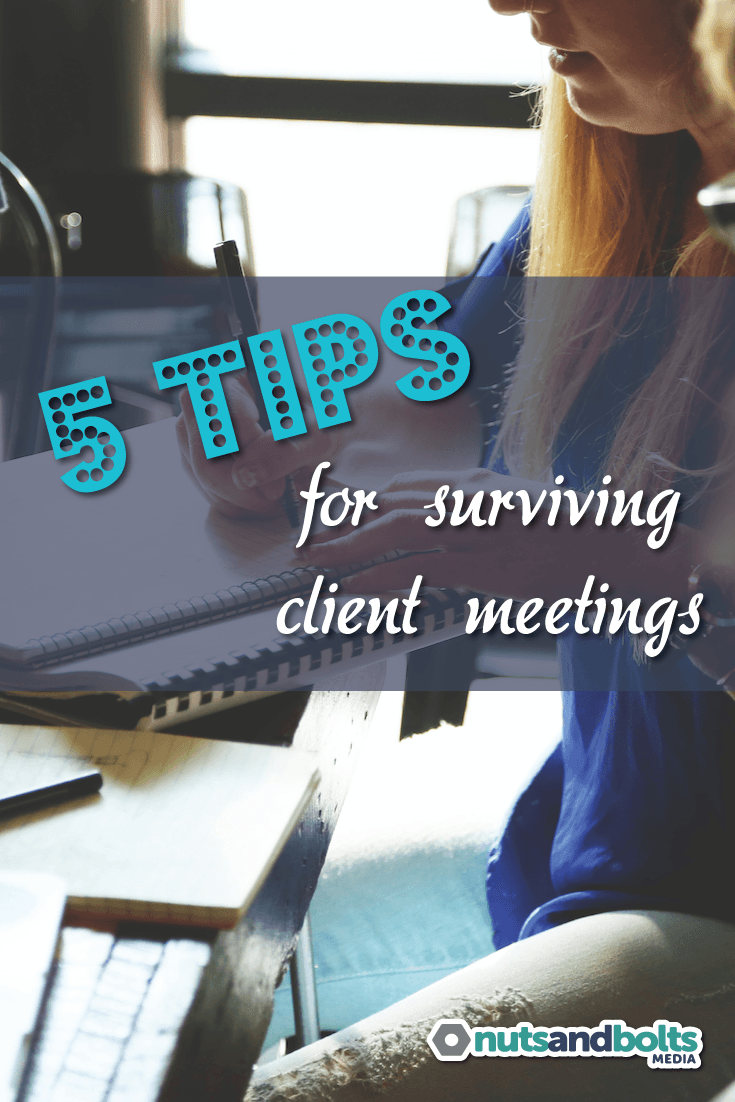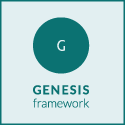Client meetings can be super stressful, especially for freelancers. When you’re used to working from home (or a solo office), it’s easy to forget all the social niceties that come with face to face interaction.
You mean I have to put on pants AND makeup? What do I do with my hands?
This topic is on my mind because, for the first time in a few years, I have to meet with a potential client this week. I’m not as nervous as I would have been as a new freelancer, but I still thought it would be a good idea to review (and share!) a few tips that have served me well in the past.
Tip 1: Client meetings should be the exception, not the rule.

In an ideal world, we’d all have plenty of time to run a business, do the actual work we’re hired for, and maintain some semblance of a family/social life. But we live in the real world where there usually aren’t enough hours in the day.
Meeting with current or potential clients can be wonderful, but it can also be a huge waste of time. I tend to communicate via email or phone more than I do in person because it’s far more efficient.
If a client wants to meet in person, I use a couple of personal rules to help me decide whether to schedule:
- Is there a clear purpose? For me, “We’d like you to come by” isn’t good enough. Meetings can drag on for hours if there isn’t an agenda and a real reason I need to be there in person.
- Do I really want this project? If I’m interested in a project, I’m happy to meet with the potential client(s) to go over how we can work together. If I’m feeling meh about the work, there’s not much point.
- Do I have time? If I can’t spend a few hours preparing and attending the meeting while providing my full attention, it would be disrespectful to the client to schedule an appointment.
Tip 2: Dress like a professional.

If you showed up at my home office, you’d probably think you walked into a homeless shelter by mistake. My typical work attire is pajamas and a bathrobe - I see no reason to dress up when I know I won’t be seeing anyone.
That said, I can still reach way back in my brain and remember when I had a real job that involved getting dressed every day. I’m not going to show up in my bathrobe to meet with a client (though part of me would love to, just to see the reaction).
A good rule of thumb is to dress at least as nicely as the client. If you’re meeting with a bank, don’t show up in jeans. Common sense, right? You’d be surprised - some of my fellow freelancers seem to forget how important first appearances can be.
Tip 3: Don’t come empty-handed.

I don’t recommend doing a ton of legwork before a client has officially hired you and paid a deposit. That said, it’s never a bad idea to prepare for client meetings by giving them something to look at.
I like to put together a typed summary of what the client is looking for and how my company can help, as well as a simple mood board to show a few possibilities for look and feel. This is not something I spend a lot of time putting together, but it does give the client a reference to look back at once the meeting is over.
Tip 4: Sell yourself!

A client meeting is your opportunity to explain why and how you can solve problems. While it’s easy to get caught up in “Oh man, I hope they hire me,” focus your energy on, “I need to show them I’m the best person for the job.”
What experience do you have that relates to this client, business, and/or project? What past work have you done that qualifies you to do a great job? Do you have a personal interest in this niche or topic? All of these are great points to consider, as the first thing a client wants to know is why they should hire you instead of someone else.
If you’re confident in your abilities and the work you’ve done in the past, this will come across in your interactions with the client or potential client. You may not be able to answer every single question on the fly, but it’s fine to say, “I’d need to research that more,” or “That’s something we’ll address if we work together on this project.”
Tip 5: Follow up.

Once you survive the meeting, don’t underestimate the importance of following up. This can be as simple as an email, thanking the client for his/her time, or as elaborate as a handwritten thank you card.
If you promised to get any information for the client after the meeting, do it quickly (within a day or two) and send it along with your followup contact. This attention to detail will remind the client how organized you are (you ARE organized, right?) and that you’re still interested in the project.
Bonus Tip: BREATHE!
No matter how well you prepare, a successful meeting that translates into a paid project is never guaranteed. You may find you aren’t the best fit (or that the client isn’t the best fit) based on what you learn when meeting face to face.
Judge your performance based on how well you communicate your skills and abilities, not whether you land the project. Walking away from a poor match takes just as much professionalism as jumping into a new opportunity, if not more.
How do you prepare for client meetings? Anything you’d add to this list?







Great tips! I hate client meetings… Seems like I give the client great suggestions then they hire someone else and pay them less money to do the same stuff I suggested. Any tips for dealing with that?
I’ve definitely had that happen a few times. Usually I present the client with a handful of ideas if they haven’t hired me yet. So if I’ve thought about the project and come up with 10 things that would be great, I might share 3-4 of those. There is always the risk that they’ll take my ideas and run with them, but if I care enough to think about the project at that level before being hired, that’s a risk I’m generally willing to take. Does that make any sense?
Basically, I wouldn’t show all your cards at the first meeting, but come up with a couple of things that are generic enough not to hurt your feelings if you don’t get the job.
I am struggling with this right now with a client. She doesn’t seem to understand that I just don’t have time to sit side-by-side and teach her this and that. She can learn WP via WP101 video tutorials. That’s not something I train. I do screen shares for custom work so they can sit, watch, take notes and follow along. Instructional meetings are just a waste of time because they tend to go off subject and it takes up more of my time. And like you mentioned, the preparation for it, the drive time to and from, just consumes the entire day.
I have a colleague who quotes clients upfront for basic WP training - she usually makes it pretty expensive since she doesn’t really want to offer it - but that way they know ahead of time that’s a separate service they’d have to pay for. If you don’t want to offer it no matter what, maybe amend your contract so they are agreeing that you don’t provide training and they can access it via X or Y if needed?
Yeah, that’s a great idea to revamp that agreement. I know folks don’t get training when they use Shopify, Squarespace, Weebly, Wix, etc., they learn on their own. By adding WP 101 I wanted to provide some sort of extra value in there.